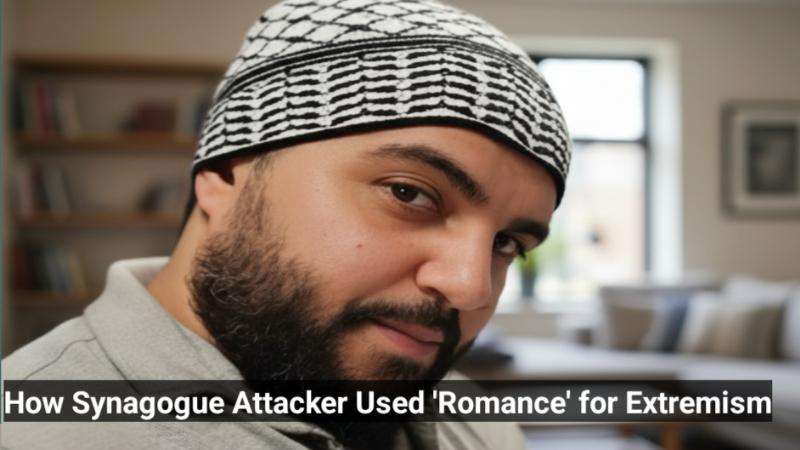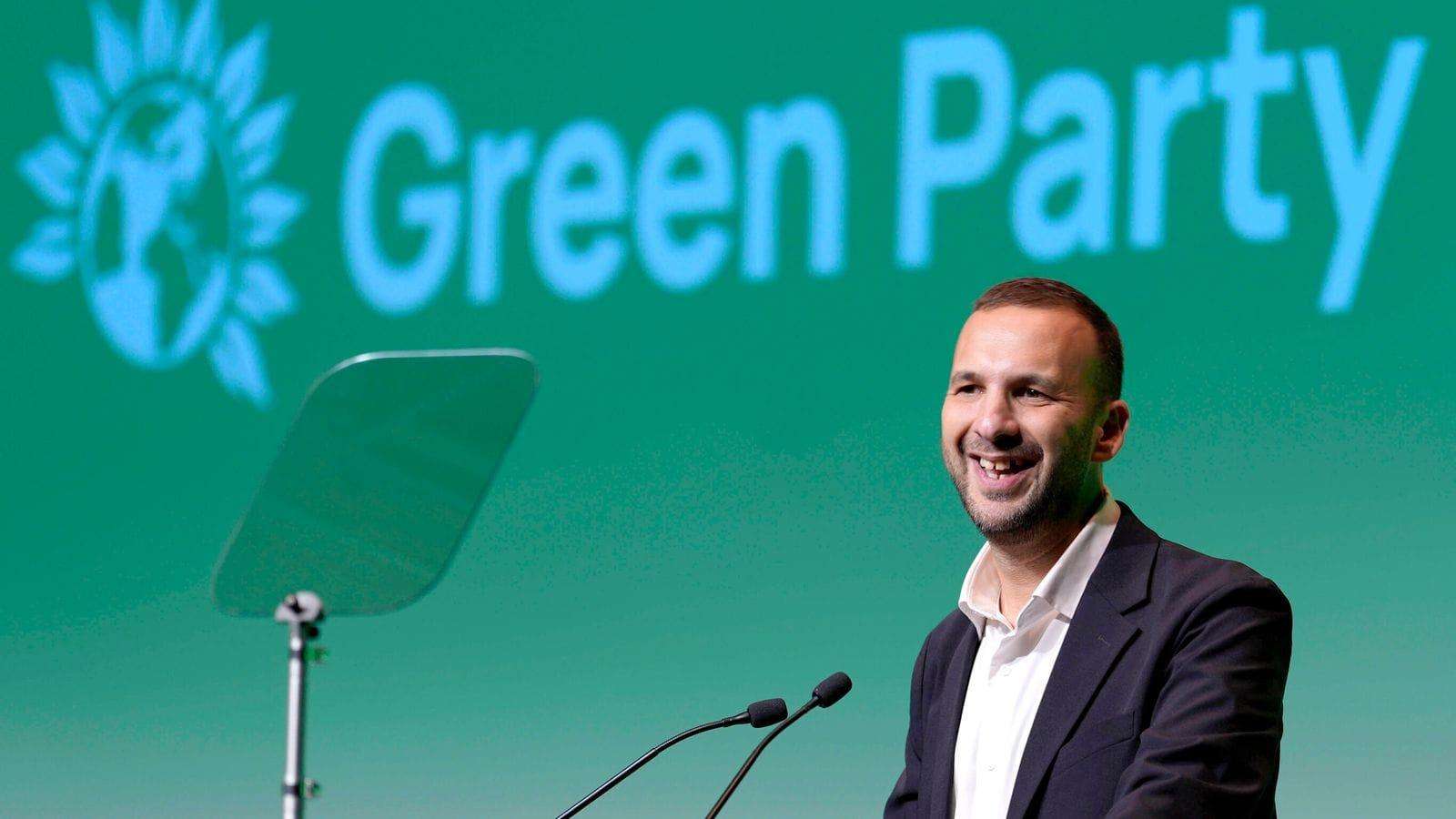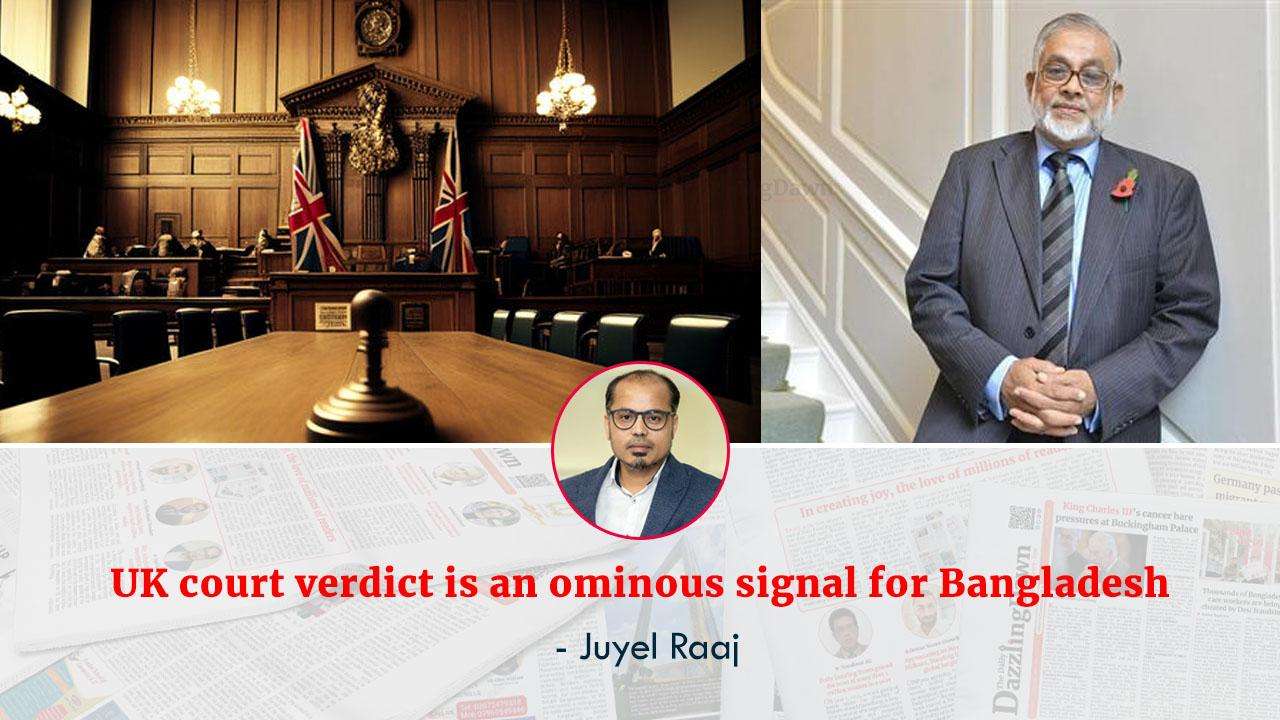According to the judgment of the Supreme Court of the United Kingdom, the war criminal Chowdhury Muinuddin, accused of killing 18 intellectuals in the 1971 Bangladesh War of Independence, got the opportunity to continue the defamation case against the Ministry of Home Affairs। Basically, in 2019, the Ministry of Home Affairs of the United Kingdom published a report with the details of the criminal crimes of war criminal Muinuddin. The then Home Minister Priti Patel shared the report on the then Twitter (now X) handle। British Home Secretary Priti Patel, BBC journalist Mishal Hussain, human rights campaigner Peter Tatchell retweeted the tweet। In that report, Chowdhury Moinuddin was termed as responsible for the heinous violent crime। These include crimes against humanity during the 1971 War of Independence in Bangladesh। Chowdhury Moinuddin alleged that the Home Secretary's comments in his tweet referring to him as a war criminal caused him defamation।
Protesting this, war criminal Muinuddin wrote a letter to the Ministry of Home Affairs in December 2019 demanding the withdrawal of the report from online। However, the British government did not respond to it।
Then on June 19, 2020, Muinuddin filed a case। The 1971 Al-Badr leader alleged that the report was made public and violated the UK's data storage policy and tarnished his personal reputation। 60 thousand pounds of compensation was demanded there।
The case was heard on February 16, 2021। The report of the Ministry of Home Affairs was taken into consideration there। Words used with Muinuddin's name, such as war criminals, criminals against humanity; The High Court did not give any order to cancel the killers of 1971।
At the hearing of the case, Priti Patel argued that if the trial on Muinuddin's charges were moved forward, it would be a misappropriation of UK ‘court proceedings। Taking that argument into account, the High Court dismissed the case on November 15 of that year।
Muinuddin then went to the Court of Appeal। On July 28, 2022, his application was also rejected and the High Court's decision and observations were upheld।On February 1, 2023, intellectual assassin Muinuddin appealed to the Supreme Court of the United Kingdom seeking permission to appeal against it।The hearing began on November 1-2 that year in a five-judge bench of the Supreme Court, after more than eight months, on June 20, the Supreme Court of the United Kingdom gave Muinuddin the opportunity to file his defamation case.
The case was heard on November 1-2, 2023। On June 20, 2024, the President (Chief Justice) of the Supreme Court of the United Kingdom, Lord Reid, announced this verdict on behalf of the court.
Lord Sails, Lord Hamland, Lord Burrows and Lond Richards were among the 5 Lorre Justices in the bench headed by Chief Justice Lord Reid। In 2019, Chowdhury Muin Uddin filed this case against the Home Office through Carter-Raq, the top law firm in the defamation case। Among his lawyers were senior solicitor Adam Tudor and counsel Jacob Dean and Lily Walker-Per.
According to the description of the case, in 2019, the British Home Office report on the ‘challenging hateful extremism of the Commission for Countering Extremism accused Chowdhury Mueen Uddin of involvement in Extremism। In 1971, the judgment of Bangladesh's ICT case against him on charges of crimes against humanity was mentioned as evidence.
For this report, Chowdhury Muin Uddin mentioned in the defamation case against the British Home Secretary that he was not involved in any kind of crime against humanity during the 1971 Bangladesh War of Independence। Rather, he rejected the allegations of Bangladeshi authorities as completely false and politically motivated.
According to the Supreme Court verdict, Chowdhury Muin Uddin was born in 1948 in East Bengal, which was then part of the state of Pakistan। The state of Bangladesh gained independence in December 1971 through the liberation war। Chowdhury Mueen Uddin has been living in the UK since 1973 and has been a British citizen since 1984। During this time he held various important responsibilities in several social and charitable organizations in Britain.
In 2013, more than 40 years after the War of Independence, Mr. Moin-uddin was convicted in Bangladesh, Mr. Moin Uddin was sentenced to death for crimes against humanity during the 1971 war in his absence by a “International Crimes Tribunal” (“ICT”)।
Some of the issues mentioned by the Supreme Court of the United Kingdom in that long judgment are ominous signals for Bangladesh, because it says -
ICT was not actually “International” but an institution of internal legal system in Bangladesh. It was invoked by special laws that required amending the Constitution of Bangladesh, to remove basic procedural protections from accused persons. ICT was not limited by the general rules of evidence and procedure, and “was allowed to rely on newspaper reports from that time on as acceptable evidence of the crime (indeed the conviction of Mr. Moin-uddin depended primarily on such reports). Surprisingly, ICT was universally condemned by human rights organisations, the UN, the EU and the UK Parliament.
Due to serious concerns about ICT and the possible death penalty he faced, Mr Moin-uddin did not, and (as the Supreme Court recognized today) could not be expected to realistically appear at trial। He was denied effective access to any due process or legal representation। Any appeal would have been completely futile (and again his presence and possibly execution would have been necessary – a fate that had already occurred on another accused person). The UK had no prospect of extraditing him (or even any extradition request). In fact, Interpol has withdrawn a red notice for the arrest of Mr Moin-uddin, which was issued at the request of Bangladesh in light of fundamental concerns regarding the ICT process.
Mr Moeen-Uddin has continued repeatedly and vigorously to clarify the innocence of the allegations through his UK lawyers। Six years after the conviction in Bangladesh courts, in 2019 the Home Office released a report (“the Report”) prepared by the Commission for Countering Extremism, a non-statutory committee of the Home Office, titled “Challenging Hateful Extremism”. In addition to being circulated in hard copies, the report has been downloaded nearly 5,000 times online and reached 900,000 followers on Home Office social media accounts. As the High Court found, the report referred to Mr Moin-uddin as reading that readers understood that he was and did one of those responsible for war crimes during the 1971 war.
Following Mr Moin Uddin's initial letter of complaint sent via Carter-Ruck in December 2019, the Home Office refused to apologize or agree to his other demands for redress, instead limiting the response to removing offensive words from the online version of the report। (And even then four months later). Mr Moin-Uddin had no choice but to file a defamation case. Instead of submitting a defense (which the Home Office had not yet done for more than three years), the Home Secretary petitioned the court to overturn Mr Moin-uddin's claim, insisting it was an abuse of process।
In particular, it was asserted that Mr. Moin-uddin's defamation claim was nothing more than an attempt by ICT in Bangladesh to use a defamation claim in the (English) High Court as an inappropriate parallel attack on his 2013 conviction. It was strongly stated by the Home Office that Mr. Mueen-Uddin had an appropriate opportunity in the ICT proceedings (and then to appeal after his conviction) and that it was his decision not to do so. The Home Secretary further asserted (with no proper evidence to support that submission) that Mr Moin-ud-Din's reputation in the UK was already similar to that of a convicted war criminal and for trying to prove to the Home Secretary । Authenticity of allegations related to events more than 50 years ago, mr. Moin-uddin should be prevented from using English courts to get the allegations true.
In the first instance, the High Court agreed with the Home Secretary's submission, thereby nullifying the claim. The Court of Appeal, by a 2 to 1 majority, agreed, although a strong dissenting judgment described the majority's approach as “unprinced” (a criticism now approved by the Supreme Court). An appeal was allowed to the Supreme Court on 1 February 2023।
The judge also noted, “I should have considered the Secretary of State's submission that the claimant's action is an abuse of process because it is difficult for [the Secretary of State] to establish his proposed defense as unreasonable.” [emphasis added]. It's hard to accept that, if the Secretary of State is unable to establish the truth of his allegations against the claimant, he can defame the claimant with impunity. The burden of proof [in establishing a true defense on defamation claims] allocates the risk of inadequacy of evidence to the defendant. If the Secretary of State is unable to establish the veracity of the complaint he chose to disclose about the claimant's conduct more than 50 years ago, he should have thought of it before publishing the report ।
Mr Moin-uddin said: “I would like to express deep gratitude to the Supreme Court for today's verdict. As a proud and long-standing British citizen who has put his faith in our justice system, it was disappointing to be denied the right to prove my reputation for such serious and false accusations made by my own government. I'm glad that, more than four years after my initial complaint, I've now been able to follow that evidence once again, which I consider to have passed several years.”
Now the British court will proceed at its own pace, Chowdhury Moinuddin will try to prove his innocence in any way possible। Because he knows very well that there will not be a very strong opponent against । And if you can somehow prove yourself innocent there, then you will get that opportunity to question the war crimes trial of Bangladesh internationally ।
Since 2013, by appointing lobbyists at home and abroad, various propaganda, rumors, misinformation and Jamaat-e-Islam and its catalysts could not be done, that work will be done by the court's verdict। So his followers will use all their might here to prove Chowdhury Moinuddi innocent।
The statement that the Home Office gave then, In particular, it was asserted that Mr. Moin-uddin's defamation claim was nothing more than an attempt by the ICT in Bangladesh to use a defamation claim in the (English) High Court as an inappropriate parallel attack on his 2013 conviction। That is what Chowdhury Moinuddin did। Parallel attack। A citizen is empowered to enter or complain to the court if the judgment of the High Court is viewed very generally।
To put it very briefly, the decision and process taken by the Court of Appeal before has been strongly rejected. And Lord Reid observed (in paragraph 36): “... Individuals have a fundamental right to enter the courts to determine their civil rights. That right has been recognized by common law for centuries, and protected by law from Magna Carta। Chowdhury Mainuddin has regained the basic right to continue the case in the court । But the content of this case will have a far-reaching impact on the judicial system of Bangladesh।
The Ghatak Dalal Nirmul Committee of 71Bangladesh, has issued an official protest। Expressing concern over this verdict, the joint statement of the three organizations says, “During the independence war of Bangladesh in 1971, there is an authentic document of Chowdhury Muinuddin's involvement in the planned killing of our elite intellectuals।
“Nevertheless we consider the Supreme Court's decision to allow him to sue the British Home Secretary for defamation seeking compensation as a serious blow to justice for war crimes committed in Bangladesh।
“Every country in the world has its own judicial system, which is internationally recognized as independent and sovereign। We think that just as Bangladesh will respect the judgment of the UK court, the UK will also respect the judgment of Chowdhury Muinuddin's case in its own legal process like the International Criminal Court of Bangladesh।
But the main initiative has to be taken by the Bangladesh government, there is enough evidence internationally to prove him guilty in the court.
When Channel Four aired a documentary titled 'World War Crime File' in 1995, the report sent detailed files to the Bangladesh government। I don't know if anyone knows what the then BNP government did with that file or whether the file is there or missing। Because after coming to Britain from Pakistan in 1971, both Ziaur Rahman and Ershad welcomed Chowdhury Moinuddink to Bangladesh and unfortunately he was given police security ।
When the Awami League government came to run the state in 1996, on September 24, 1997, Farida Banu, sister of martyred Professor Ghiyas Uddin, filed the first murder case against Chowdhury Moinuddin at Ramna police station। Later, an intelligence officer named Munshi Atiq from Ramna police station came to London to investigate the incident। And as far as is known, he went back and submitted an investigation report।
In addition, an eleven-page report titled "Muslim Brother Hood Review: Main Finding" was published in the House of Commons on 17 December 2105, investigating supporters, sponsors and related organizations and individuals of militants in Britain and Europe। The investigation report, which was conducted with the help of the Foreign Office and the Intelligence Department of the United Kingdom and twelve European countries for more than a year, revealed the long-standing relationship between various Islamic militant organizations including the Muslim Brotherhood and Hamas in Britain and Europe। Jamaat-e-Islami was accused of being one of the mainstays of this long relationship, along with other organizations in the UK। The investigation, conducted by two experienced British government bureaucrats, Sir John Jenkins and Charles Farr, revealed how the Western world's liberal immigration policies and laws were evaded by anonymously collecting funds through various charity organizations and breaking the names of the poor and needy and financial assistance to militant organizations in various Muslim countries. is donated.
The report also mentioned that the 'Islamic Forum for Europe (IFE)' of fugitive war criminal Chowdhury Moinuddin, who was sentenced to death by the International Criminal Tribunal for Bangladesh, is very active in British mainstream politics। Parts of local government in East London's Tower Hamlets are supported by the 'Respect Party। The report also mentions involvement with the Islamic Forum for Europe (IFE)। After the publication of the report, the then British Prime Minister David Cameron said in his written statement to the House of Parliament, "We have already taken this investigation report seriously and started taking appropriate steps। The government will take strict action against the sponsors of militancy living in Britain or in any country of the world.
The Bangladesh government should now appoint a representative on behalf of Bangladesh in the court to prove Chowdhury Moinuddin as a criminal। If it fails to do that, the entire trial process of Bangladesh's war crimes will be questioned internationally.
--
Author: UK expatriate journalist and columnist
The opinions expressed in the column are solely the author's.


_3.jpg)
_4.jpg)




.svg)


